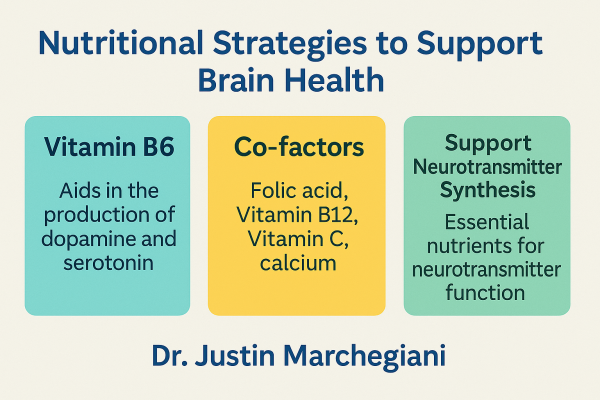
If you often feel foggy, distracted, or mentally drained, the culprit may not be a lack of sleep or caffeine—it could be unstable blood sugar. In our fast-paced world, cognitive function is everything, yet many people sabotage their brain health daily without realizing it. Dr. Justin Marchegiani, a leading expert in functional medicine, reveals how breaking free from the blood sugar roller coaster can dramatically improve your mental performance and focus.

Your brain is a high-energy organ, consuming nearly 20% of the body’s energy. That energy is derived mainly from glucose—your blood sugar. When blood sugar levels fluctuate wildly due to refined carbs or skipped meals, your brain struggles to maintain equilibrium. This leads to:
Poor focus and mental fatigue
Irritability and mood swings
Memory lapses and slow information recall
What causes these fluctuations? It starts with the standard Western diet, which is heavy in sugar and processed grains and lacking in protein and healthy fats. These foods act like “gasoline on a fire,” creating quick energy spikes followed by rapid crashes, leaving you feeling depleted and mentally sluggish.

Blood sugar spikes trigger an increase in insulin production. Over time, this can lead to insulin resistance—a state where your cells stop responding appropriately to insulin. When that happens, glucose remains elevated in the blood, contributing to inflammation, oxidative stress, and impaired brain signaling.
Cortisol, the body’s stress hormone, also plays a role. When blood sugar drops, your adrenal glands pump out cortisol to raise it back up. But frequent swings exhaust your adrenal system, contributing to brain fog, memory issues, and even anxiety or depression. Long-term elevation of cortisol particularly affects the hippocampus, the brain’s center for learning and memory.
To regain focus and balance, Dr. Marchegiani suggests building meals that stabilize blood sugar rather than spike it. Here’s how:
Prioritize Protein: Grass-fed meats, wild-caught fish, and pasture-raised eggs support steady glucose and neurotransmitter production.
Use Healthy Fats: Avocados, olive, and coconut oil serve as “logs on the fire,” providing long-lasting fuel without crashes.
Ditch the Sugar and Grains: Replace high-glycemic foods with fibrous veggies, low-sugar fruits, and nutrient-dense starches like sweet potato or squash.
Brilliant Timing: Eat regular meals to prevent low blood sugar and avoid snacking on high-carb processed foods.

Brain function is not just about avoiding sugar—it's about ensuring your body has the right raw materials. Nutrients that support neurotransmitter production and brain health include:
Vitamin B6: Crucial for dopamine and serotonin production—key neurotransmitters for focus and mood.
Vitamin B12 and Folate: Essential for methylation, a process that supports cognitive health and detoxification.
Vitamin C: Supports adrenal health and neurotransmitter synthesis.
Magnesium and Calcium: Critical for nerve signaling and brain plasticity.
Dr. Marchegiani often incorporates these nutrients into customized protocols using professional-grade supplements when dietary intake is insufficient.
You can’t manage what you don’t measure. That’s why Dr. Marchegiani recommends advanced lab testing to uncover hidden patterns in blood sugar control and metabolic health. Key tests include:
Fasting Glucose and Insulin: Reveal baseline sugar handling and early insulin resistance.
HbA1c: Shows average blood sugar levels over three months.
C-Peptide: Measures insulin production and pancreatic function.
Functional Glucose Tolerance Testing (fGTT): Tracks how your body handles glucose over several hours—a powerful tool for pinpointing energy dips and brain fog triggers.
Dr. Marchegiani uses lab data to create a tailored health roadmap for each patient. A typical plan might include:
Adjusting macronutrient ratios (more fat, fewer carbs)
Supporting adrenal function with adaptogens and targeted nutrients
Reducing inflammation through dietary and lifestyle changes
Using supplements to support mitochondrial function and brain energy
This functional approach addresses symptoms and corrects the underlying imbalances that cause poor focus and mental fatigue.
Dr. Marchegiani’s approach is grounded in scientific research:
A 2018 study published in Nutritional Neuroscience found that glycemic control was directly associated with improved executive function and memory in older adults (source).
A 2020 review in Frontiers in Endocrinology linked insulin resistance with increased risk for cognitive decline and Alzheimer’s disease (source).
Clinical trials show that diets high in protein and low in sugar reduce symptoms of ADHD and improve cognitive performance in children and adults (source).
If you're tired of living in a fog or relying on caffeine to get through the day, it's time to take action. Dr. Justin Marchegiani offers expert support to help you understand your body and reclaim your focus.
👉 Schedule your free consultation today at www.justinhealth.com/free-consult
Together, we’ll create a custom health plan that targets your root causes and supports long-term mental clarity.
The connection between blood sugar stability and cognitive performance is undeniable. By making wise dietary choices, addressing nutrient deficiencies, and utilizing targeted functional medicine testing, you can dramatically improve your ability to focus, think clearly, and stay mentally sharp—naturally.
Don’t settle for brain fog as your daily norm. With expert guidance from Dr. Justin Marchegiani, you can break free from the blood sugar roller coaster.
====================
Recommended Products
====================
IN CASE YOU MISSED IT:
How Your Diet And Blood Sugar Can Weaken Your Adrenals | Podcast #340